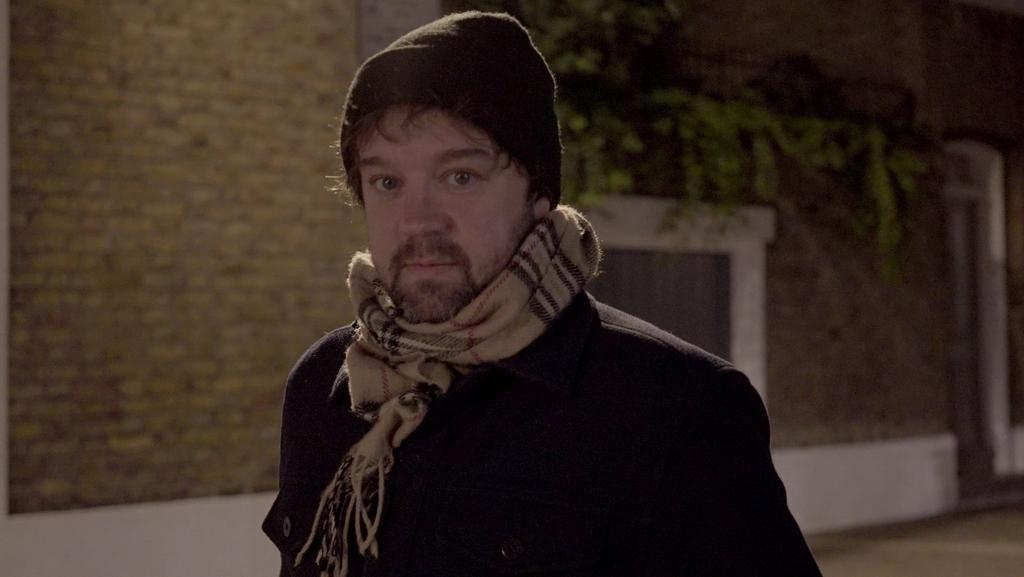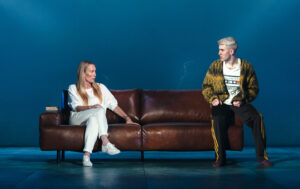“Do we really know anything about this man?”: An interview with The Rise of the Murdoch Dynasty director Jamie Roberts

The Rise of the Murdoch Dynasty is a tremendously gripping documentary miniseries that aired on BBC in July. Now available on iPlayer, the three-part series chronicles the rise, fall and rise of Rupert Murdoch’s business empire as it intertwines with the most important political events of the past 30 years. Examining Murdoch’s story from both sides, the series employs an amazing range of interview subjects, from political figures to newspaper editors, in addition to rare archive footage and a compelling narrative structure.
We are grateful to series director Jamie Roberts, who took the time to speak to us in depth about how he first got on board, working with award-winning production company 72 Films, securing great access, and developing the family tree diagram that builds across the three episodes. The filmmaker also shared his thoughts on comparisons with the TV series Succession, his favourite clips from the archives, and what he recommends viewers to read to further explore the Murdoch empire.
The Murdoch dynasty is one that has lasted decades and will continue to do so for a long time. But where does the journey of this story begin for you? How did you first get on board with this documentary idea?
I was finishing off a project I was working on and, when looking for the next one, myself and series producer Owen Phillips were talking about phone hacking. That had been a big story that I hadn’t paid much attention to when it happened but I became interested to know more. I read the Nick Davies book Hack Attack and thought there was a really fascinating story there. One thing led to another and I met with the production company 72 Films, who were already looking at the story of Rupert Murdoch.
Our interests cross-pollinated and the second episode of The Rise of the Murdoch Dynasty, which is about the phone hacking scandal, was how I would have initially approached it, but the BBC were looking at doing something wider on the Murdoch empire, so we built it out from there. 72 Films had previously done Trump: An American Dream and House of Assad, so they were big fans of archive documentaries and telling stories that we all kinda know, but also can learn so much more about through archive and exploring from different angles.
Due to the continuous cycle of the Murdoch dynasty, do you think you will revisit the subject in the future?
I think I’ll be revisiting the tentacles of it probably for the rest of my life, because his empire taps into British power and, of course, the leadership in America and Australia too. Through Murdoch, we have a glimpse of how power and business works globally. Rupert is caught up in so many of the events that relate to the lives of everyone in the UK that almost anything now can be linked to something we looked at in the series. There’s obviously a lot more in the story that we could have told, but we only had three hours.
We could’ve started even earlier and showed his rise in Australia. Quite a lot of documentaries have already been made which start from 1969, when he came to the UK, and we felt that 1995 was a crucial year to start from in order to understand his career. Even now, Fox seems to be going a bit cold on Donald Trump and people are carefully watching to see who they’ll back for the upcoming election. Rupert Murdoch has just started Times Radio and there are other projects in the pipeline. He’s still there, casting his shadow over the new batch of media moguls.
Lauren Greenfield’s The Kingmaker, which came out last year, was similar in how it was about the rise, fall and rise again of an old power player in the Philippines. In both cases, current leaders manage to get these powerful old people to wield their power and become relevant again (in that film’s case it was Imelda Marcos and Rodrigo Duterte, and in yours it’s Farage and Trump). Is it something you observed too, similar things happening in other areas of the world?
I haven’t seen that film yet, but I really want to. You’ve reminded me, so I will see it. But, yeah, with Murdoch it’s well documented that he’s utilised similar instruments for the Australian elections. Over there, he owns about 70% of the print media, which is a hell of a lot more than here in the UK.
People have said we weren’t balanced, but we tried to get both sides of the story, interviewing people who had worked for him as well as those who were affected on the other side. You can make up your own mind listening to them.
You had a robust set of talking heads – politicians, journalists and other key individuals who had worked with Murdoch or been affected by his newspapers. Could you share some insights into securing great access across the spectrum?
It was the biggest challenge to try and get all these voices. They had to be inside voices or have the credibility to speak on the subject because, in archive films, you can literally just get a journalist to sit down and tell you the whole story from a second-hand perspective. But that’s never going to really construct how the events happened. My team had a whiteboard of people who we wanted to speak to and we were just calling them all, establishing a dialogue, and that was the first four or five months of production.
In some cases, it took even more time to get them to sit down with us because they had busy calendars and UK politics were occupying them. Sometimes it was just the logistics of meeting them for an interview, like Andrew Neil was based in the South of France and we were on a budget [laughs]. But we were determined to pursue as many voices we could who had been inside the empire. We had approached the Murdoch family but we knew that they probably wouldn’t want to do it so we just approached direct sources.
Andrew Neil, for example, had started off at the Sunday Times, hired as the editor by Rupert Murdoch himself, and worked there for twelve years. He’s continued to be in Murdoch’s orbit throughout his whole career, so we knew he’d give a really good interview. I’d learnt how important it was to have inside voices when making films on the Manchester attack and Grenfell, as we sourced first-hand witnesses rather than third-hand pundits who would have just told us the story that they’d learnt from somebody else.
You utilised rarely-seen archive footage for the film – what was some of the most interesting footage for you?
There are two bits that stick out to me. The first is the footage of Blair and Murdoch on Hayman Island, found by Sophia Doe, our archive producer. We had some footage of it already but Sophia diligently kept going back and managed to retrieve the original roll of film in Australia. It was a fully formed scene and set up the premise of the show – the two battles of succession. One is about which child will take over from their father, and the other is about who will be Britain’s next Prime Minister.
The second bit was the footage of Nigel Farage and Murdoch at the garden party, where they’re celebrating the Brexit vote. The guy who shot it is a journalist and political satirist who had gone to the garden party with Lily Allen. It was hosted by an owner of a major newspaper who I’m forgetting. The guy saw Farage and Murdoch and pretended to take a selfie with them but videoed it. It was useful for us because it showed how Farage and Murdoch were celebrating the vote after their plan had come to fruition. When we interviewed Farage, we showed him the clip and he found it quite funny that this triumphant moment was secretly filmed.
Your documentary does an excellent job at essentially presenting those two successions as a fait accompli. In the future, do you think there will be a democratic process in the UK, US or Australia without the influence of the Murdoch dynasty?
We’ll just have to wait and see. I do think Fox News will have a huge influence on the next US election. Murdoch is 89 years old and has taken a step back. He can’t live forever, his personal influence could start to wane, but most of the major power players of the three countries are still very close to Murdoch and have courted his support. I think now all eyes are on Lachlan [Murdoch, Rupert’s son] and how he’ll manage Fox News and develop the business.
Going back to the craft, the most striking element for me was the family tree graphic, which showed just how closely tied world powers are to Murdoch. What was the genesis of this storytelling device?
There’s a really good animation company we worked with called Peep Show who make those visual motifs. As I said before, my interest was sparked from the phone hacking story and I initially found that saga confusing because so many different people were involved. It felt a bit inaccessible if you didn’t already know everyone. We wanted to lay it out because connections have been so important to generating the power of the Murdoch family.
Rupert Murdoch employs Rebekah Brooks who’s good friends with Alastair Campbell who works for Tony Blair’s campaign – there’s a powerful web. So we needed a simple device that illustrated this, and the family tree diagram continually reminds the viewers of where we are in this network of power. And the UK one that we did is just one galaxy in the universe of Murdoch!
How do you feel about the comparisons to the TV show Succession?
[Laughs] I don’t mind it and I know there’s a lot of people who’ve compared the two, but it’s a chicken-and-egg situation because the pilot of that show was about the Murdoch family and they developed it from there. I hadn’t seen Succession until about halfway through making this documentary, and it’s amazing but I didn’t want to get wedded to it.
The writers of that show are brilliant dramatists because they’ve made their version of the story so watchable and entertaining and also because of how they’ve imagined the storyline. The bits we found in the archive are uncannily similar. At the start of episode 3 of our documentary, when Lachlan and his father go back to Aberdeenshire, there’s a whole episode like that in Succession. There are definitely strong parallels there.
I’ve been impressed by the entirety of 72 Films’ output. Could you share some of the keys to how the production company maintains such a high quality of storytelling?
Like with any other great production company, it’s all about the people. David Glover, the executive producer on this doc, has a nose for a good story and is especially interested in bringing historical stories to life in interesting ways. From subjects like the Nazis to Bashar al-Assad, they’re always telling important stories. I loved working with David on this because he has a real respect and love for archive, and that allowed our team to really mine for great footage that would serve the story and not just be there as wallpaper.
David had a lot of influence on making this feel like you were watching a drama series, something that grips you and doesn’t feel like you should watch just because it’s informational. A lot of great, passionate people work at 72 Films and they have a good radar for what’s interesting to audiences.
Ultimately, what are you hoping for people to take away from this series?
I would say it’s the same thing that I wanted when I came to making it and that’s that there’s this polarising figure who we hear a lot about, but do we really know anything about this man? Do we know anything about what he’s done and can do? Is he a conspiratorial figure that we just like to say negative things about? We wanted to really discover the answer to these questions.
Hopefully, viewers get to understand who Murdoch really is, how he fits into the world, and the extent of his power and influence. There’s a lot of stuff made about Murdoch but much of it is dry or dense and it doesn’t necessarily have the viewer in mind. We wanted to avoid that and tell a story that would be accessible and engaging to watch. That was an effect 72 Films had achieved very well with House of Assad.
Even though there is a lot of stuff that’s too dry and dense for viewers to engage with, are there resources that you recommend to readers who want to learn more about the Murdoch dynasty?
Nick Davies’s book Hack Attack is a brilliant book that captures just how dramatic and important the phone hacking scandal was. Through it, you learn a lot about the Murdoch empire too. Piers Morgan’s autobiography The Insider, which is written in diary form and is about his time as editor of News of the World, is also really good because it’s slightly bonkers and features all these extremely powerful people acting in the most insane ways.
It’s quite entertaining and he might have exaggerated some stuff but, whatever you think of Piers Morgan, it’s worth reading to see what he’s written about this mad gallery of characters who all connect to one another. The other book I recommend is Gabriel Sherman’s The Loudest Voice.
That’s the one they adapted into a TV series starring Russell Crowe.
Yeah, and I wasn’t a huge fan of the show. I liked it, but the book was more revealing. Sherman and two other journalists, Sarah Ellison and Ken Auletta, have some of the best books and long reads about the Murdoch empire. I recommend seeking them out.
Thank you for the recommendations and thank you so much for your time, Jamie. We look forward to your future projects.
Thank you too for taking an interest!
Musanna Ahmed
The Rise of the Murdoch Dynasty is available to stream on BBC iPlayer until 28th July 2021.
Read our review of the series here.
Watch the trailer for The Rise of the Murdoch Dynasty here:

























Facebook
Twitter
Instagram
YouTube
RSS